Steps toward the mission
Today, we're excited to announce that we're renaming Metaphor to "Exa” to better reflect our mission.
We're also launching a new type of search experience – highlights.
With highlights, you can instantly extract any webpage content from each search result using a customizable embedding model.
All together, we’re taking big steps toward our core mission – organize the world’s knowledge.
Why Exa?
The internet contains the collective knowledge output of mankind – all the great works of art and literature, millions of essays, hundreds of millions of research papers, billions of images and videos, trillions of ideas sprinkled across tweets, forums, and memes.
Searching the internet should feel like navigating a grand library of knowledge, where you could weave insights across cultures, industries, and millenia.
Of course it doesn’t feel that way. Today, searching the internet feels more like navigating a landfill.
Many. have. debated. what's. wrong. with. search.
But the core problem is actually simple – knowledge on the internet is buried under an overwhelming amount of information.
The core solution is also simple – we need a better search algorithm to filter all that information and organize the knowledge buried inside.
Exa is going to organize the world’s knowledge.
To illustrate the problem, try googling "startups working on climate change".

You get 43,800,000 results. That’s a lot of information! But how much actual knowledge? I see many listicle results, but no actual startups working on climate change.
That's because Google still uses a keyword based algorithm. Keywords as a filtering mechanism may have worked in 1998, but they don't work for an internet with a thousand times more content and an SEO industry devoted to hacking keywords.
Exa, in contrast, is the first web-scale neural search engine. Our algorithm uses transformers end-to-end, the same technology that built ChatGPT. This enables us to filter the internet by meaning, not by keyword.
Here's the same search on Exa:
Note that these results don't necessarily mention the words "climate change" or "startup". Exa filtered out all the noisy webpages – the listicles talking about startups – and returned the actual knowledge – the startups themselves.
Exa's goal is to understand any query – no matter how complex – and filter the internet to exactly the knowledge required for that query.
This is the solution to the problem of overwhelming information. Instead of 40 million noisy/redundant links, we’ll filter down to exactly the pieces of knowledge needed. In doing so, we’ll convert an internet landfill into a library of knowledge with each and every search.
That's why we chose the name Exa. Exa means 10^18th power. Google means 10^100th power. While Google aims to surface all information, Exa aims to filter all information into organized knowledge. And when it comes to organized knowledge, 10^18 is greater than 10^100.
Why .ai?
It just so happens that a creature recently emerged on this planet with a particularly strong need for organized, high quality knowledge.
AIs, powered by LLMs like ChatGPT, are overhauling the way we do knowledge work. But to perform knowledge work optimally, AIs must incorporate the internet’s knowledge. That means they need to be paired with a web retrieval system, like Exa.
The quality of web retrieval particularly matters for LLMs. If retrieval returns junk information, the LLM will output junk content. If the retrieval is powerful enough to filter the internet to the right knowledge, the LLM will output the highest quality content possible.
Most of our customers have tried search APIs like Bing and Google SERP. They come to us because those APIs just don’t work for their use cases. Those APIs work for humans, but not for LLMs, which have quite different needs.
We’ve been on the frontlines witnessing this transformation of knowledge work and of retrieval. We believe AI applications will soon search the internet more than humans.
That’s why Exa wasn’t just built with AI, it was also built for AI.
Building with the Exa API
Exa was designed with all the features necessary for AI applications:
- Filter out noisy SEO results to only the type of content the AI requests
- Handle long queries – a sentence, a paragraph, or even a whole webpage can be a query
- Retrieve the page content of any url for downstream processing
Today we're adding highlights. Highlights means Exa can instantly extract any piece of content from any result's webpage. Behind the scenes, we’re chunking and embedding full webpages with a paragraph prediction model. Because this happens live, you can customize highlights length, # per page, and specify a secondary query specific to what content you want to find.
Customers using highlights have seen significant increases in user conversion compared to Bing and other search providers.
It's exciting to see customers using Exa for so many applications that just weren't possible a year ago, from research paper writing assistants, to lead generation research bots, to learning tools for students.
A mission we take seriously
As builders at the doorway to the world’s knowledge, we recognize the power we wield. The knowledge people consume underlies nearly everything, from our politics to our scientific progress to our daily perceptions of the world.
We believe that organizing the world's knowledge, and thereby giving users immense power to filter the internet, is critical societal infrastructure that does not currently exist.
Luckily, our incentives are aligned with our values. We have no ad-based need to monetize attention. Our API customers want the highest quality search possible. So do we. When the internet feels like a library of all knowledge, we'll know we succeeded.
If you want to help us build some of the coolest technology – designing internet-scale web crawling infrastructure, training foundation models for search on our own GPU cluster, serving custom vector databases at scale – you can check out our roles here.
And if you're ready to build with the Exa API, you can sign up here.
Thanks for reading and we'll keep writing more posts soon so you can join us on the ride!



